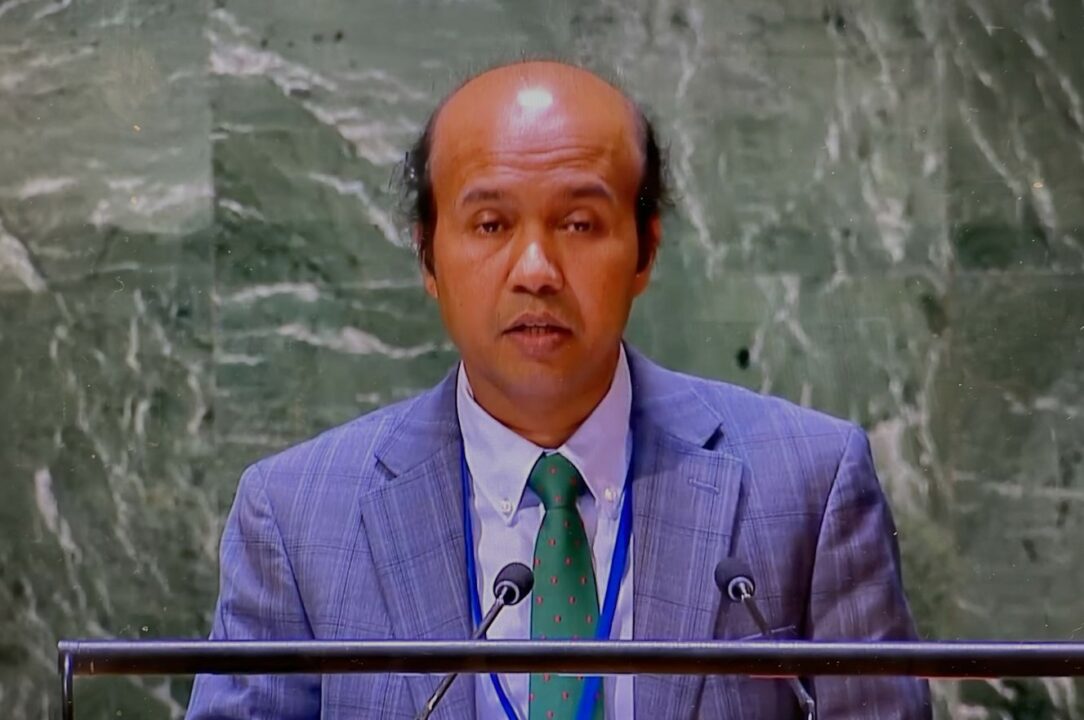Mr. President,
We all need a healthy ocean to survive and thrive. However, the ocean and its intricate ecosystems face an alarming array of threats in the contemporary world. The looming specter of climate change, rising sea levels, unsustainable fishing practices and pollution collectively pose an imminent danger to the delicate balance of the marine environment. Urgent and concerted efforts are imperative to safeguard the oceans, ensuring their sustainability and resilience for the benefit of current and future generations.
We thank the UN Secretary-General for his reports. We also thank the coordinators for their excellent works in facilitating two resolutions under this agenda item. As part of its steadfast commitment to the obligations of the two resolutions, Bangladesh has once again cosponsored both of them this year.
Mr. President,
As the one of the low-lying coastal countries in the world, Bangladesh attaches high importance to the health of the ocean. Just one-meter sea-level rise can submerge approximately 40 percent of the southern part of Bangladesh resulting into internal displacement, food insecurity and economic loss.
However, Bangladesh has undertaken several initiatives at the national and international level to preserve the health of oceans.
At the national level, we have updated our national legislation to bring it in conformity with UNCLOS. The newly enacted Maritime Zones Act and Blue Economy Development Work Plan of Bangladesh will ensure efficient utilization, conservation and scientific management of our marine resources.
At the international level, we are pleased to participate in the ongoing proceedings in the International Court of Justice and the International Tribunal for the Law of the Sea for advisory opinions on the legal implications of climate change and sea level rise on the rights of present and future generations.
Mr. President,
Today, as we deliberate on the ocean and law of the sea debate, please allow to flag a few points:
First, we recall that the theme of the 23nd Informal Consultative Process of the Ocean and Law of the Sea focused on ‘New maritime technologies: challenges and opportunities. New Maritime Technology offers the potentials for scientific exploitation, conservation, and management of ocean resources. It can play a crucial role in addressing adverse impact of climate change by monitoring, better understanding, preventing and potentially reversing those negative impact of climate change. However, technological advances carry their allotment of negative impacts also. The lack of financing and capacity-building continues to present challenges for the development and implementation of new maritime technologies to address climate change particularly for the Developing, Least Developed Countries and Small Island Developing States. In such case, we need to ensure, no one is left behind.
Second: we commend the important work carried out by three bodies under UNCLOS. However, we wish to express our concern with the current working method of the Commission on the Limits of the Continental Shelf, which has a long queue of pending submissions.
Bangladesh submitted the required technical and scientific data in support of its continental shelf beyond 200 nautical miles to the CLCS in 2011. The preparation of the submission entailed substantial financial and technical investments, which as an LDC was not an easy undertaking for us. Yet we prioritized the submission, and invested resources for its conclusion.
We also took measures to resolve our maritime boundary with our neighbors through the dispute settlement procedure prescribed by the UNCLOS. To give effect to this new development we made an amended submission, which was presented before the Commission on 02 March 2022 during its 54th plenary session.
However, we are deeply disappointed at the Commission’s decision of not to form a sub-commission for Bangladesh to settle the matter, given that the maritime boundary disputes of Bangladesh with its neighbors have already been resolved through the dispute settlement mechanisms established by the UNCLOS itself.
Thus, we believe that the Commission has a responsibility now to process the submissions by the State parties on their merit, and through strict adherence to the provisions of the Convention. We earnestly hope that CLCS would soon form a sub-commission to review the amended submission of Bangladesh.
Third: The conclusion of the Biodiversity of Areas Beyond National Jurisdiction (BBNJ) Agreement by the United Nations General Assembly in June 2023 marks a historic milestone in the realm of multilateral diplomacy. Four decades after the enforcement of the UNCLOS, this achievement represents a significant step towards global governance and responsibility for the protection and sustainable use of marine biological diversity beyond national jurisdiction.
Now, we all need to work hand-in-hand to sign and ratify the agreement by broader states parties. Bangladesh has already signed the agreement and we call upon other UN member states to ratify the agreement for its early enforcement.
Finally: capacity building and transfer of marine technology remain crucial for the implementation of UNCLOS and related instruments including the BBNJ Agreement, particularly for the Developing, Least Developed Countries and Small Island Developing States. In this regard, we stress on the need for international cooperation at national, regional and global levels, to address, gaps in capacity-building and technology transfer in ocean affairs and the law of the sea.
I thank you all for your kind attention.

